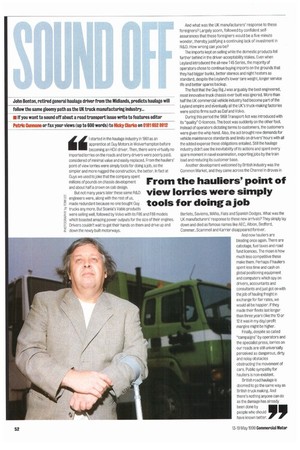John Benton, retired general haulage driver from the Midlands, predicts
Page 54

If you've noticed an error in this article please click here to report it so we can fix it.
haulage will follow the same gloomy path as the UK truck manufacturing industry...
• if you want to sound off about a road transport issue write to features editor Patric &wane or fax your views (up to 1100 words) to Micky Clarke on I1181652 8112
d I started in the haulage industry in 1961as an
apprentice at Guy Motors in Wolverhampton before becoming an HGV driver. Then, there were virtually no imported lorries on the roads and lorry drivers were poorly paid, considered of minimal value and easily replaced. From the hauliers' point of view lorries were simply tools for doing a job, so the simpler and more rugged the construction, the better. In fact at Guys we used to joke that the company spent mhos of pounds on chassis development and about half a crown on cab design.
But not many years later these same R&D engineers were, along with the rest of us, , made redundant because no one bought Guy trucks any more. But Scania's Vabis products were selling well, followed by Volvo with its F86 and F88 models which boasted amazing power outputs for the size of their engines. Drivers couldn't wait to get their hands on them and drive up and down the newly built motorways. And what was the UK manufacturers' response to these foreigners? Largely scorn, followed by confident selfassurances that these foreigners would be a five-minute wonder, thereby justifying a continuing lack of investment in R&D. How wrong can you be?
The imports kept on selling while the domestic products fell further behind in the driver-acceptability stakes. Even when Leyland introduced the all-new 145 Series, the majority of operators chose to continue buying imports on the grounds that they had bigger bunks, better stereos and night heaters as standard, despite the Leyland's lower tare weight, longer service life and better spares backup.
The fact that the Guy Big J was arguably the best engineered, most innovative truck chassis ever built was ignored. More than half the UK commercial vehicle industry had become part of the Leyland empire and eventually all the UK's truck-making factories were sold to firms such as Daf and Volvo.
During this period the 1968 Transport Act was introduced with its "quality" 0-licences. The boot was suddenly on the other foot. Instead of operators dictating terms to customers, the customers were given the whip hand. Also, the act brought new demands for vehicle maintenance standards and limits on drivers' hours with all the added expense these obligations entailed. Still the haulage industry didn't see the inevitability of its actions and spent every spare moment in navel examination, exporting jobs by the train load and reducing its customer base.
Another development welcomed by British industry was the Common Market, and they came across the Channel in droves in Berliets, Saviems, MANs, Fiats and Spanish Dodges. What was the UK manufacturers' response to these new arrivals? They simply lay down and died as famous names like AFC, Albion, Bedford, Commer, Scammell and Karrier disappeared forever.
And now hauliers are bleating once again. There are cabotage, fuel taxes and road fund licences. The moan is how much less competitive these make them. Perhaps if hauliers spent less time and cash on global positioning equipment and computers which spy on drivers, accountants and consultants and just got on with the job of hauling freight in exchange for fair rates, we would all be happier. If they made their fleets last longer than three years (like the 10 or 12 it was in my day) profit margins might be higher.
Finally, despite so called "campaigns" by operators and the specialist press, lorries on our roads are still universally perceived as dangerous, dirty and noisy obstacles obstructing the movement of cars. Public sympathy for hauliers is non-existent.
British road haulage is doomed to go the same way as British truck making. And there's nothing anyone can do as the damage has already been done by
people who should pp have known better.
















































































































